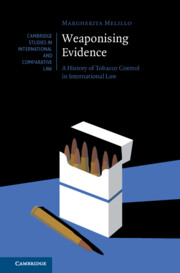Book contents
- Weaponising Evidence
- Cambridge Studies in International and Comparative Law: 183
- Weaponising Evidence
- Copyright page
- Contents
- Acknowledgements
- Chronology
- Table of Cases
- Table of Treaties
- Abbreviations
- 1 Introduction
- 2 The Negotiation of the WHO Framework Convention on Tobacco Control
- 3 The Activities of the FCTC Conference of the Parties
- 4 Philip Morris v Uruguay (ICSID) and Australia – Plain Packaging (WTO)
- 5 Conclusions
- Annex List of Interviewees
- Index
- Cambridge Studies in International and Comparative Law
2 - The Negotiation of the WHO Framework Convention on Tobacco Control
Building an Evidence-Based Treaty
Published online by Cambridge University Press: 11 January 2024
- Weaponising Evidence
- Cambridge Studies in International and Comparative Law: 183
- Weaponising Evidence
- Copyright page
- Contents
- Acknowledgements
- Chronology
- Table of Cases
- Table of Treaties
- Abbreviations
- 1 Introduction
- 2 The Negotiation of the WHO Framework Convention on Tobacco Control
- 3 The Activities of the FCTC Conference of the Parties
- 4 Philip Morris v Uruguay (ICSID) and Australia – Plain Packaging (WTO)
- 5 Conclusions
- Annex List of Interviewees
- Index
- Cambridge Studies in International and Comparative Law
Summary
Chapter 2 analyses the negotiation of the WHO Framework Convention on Tobacco Control (FCTC, 1998–2003). It illustrates that evidence was a key element of the negotiations and argues that the FCTC was developed as an evidence-based treaty to counteract the attacks on evidence by the tobacco industry. After a historical introduction, Section 2.2 outlines the theoretical background of the chapter, introducing the notion of ‘treaty entrepreneurs’. Sections 2.3, 2.4, and 2.5 proceed to delineate and analyse how the strategy on evidence unfolded during the FCTC negotiations. Section 2.3 illustrates how legal expertise from international environmental law was borrowed to build a treaty that could embed and develop evidence. Section 2.4 describes how evidence was mobilised to build the treaty. First, the treaty entrepreneurs relied on existing knowledge within the WHO; second, they served as a catalyst for the production of additional evidence from other relevant actors, most notably the World Bank. Section 2.5 reviews how the treaty entrepreneurs framed the available evidence and how the label ‘evidence-based’ started being used. Section 2.6, finally, draws some conclusions on the implications of adopting a strategy on evidence to push forward the negotiations of a treaty.
Keywords
- Type
- Chapter
- Information
- Weaponising EvidenceA History of Tobacco Control in International Law, pp. 31 - 113Publisher: Cambridge University PressPrint publication year: 2024



